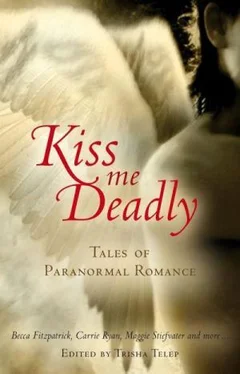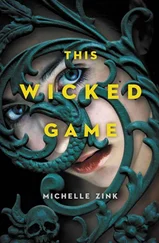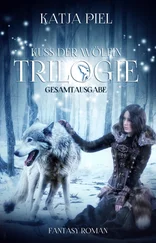“My lady,” Gitta said in wonder. “You did it.”
The girl did not look up.
Gitta tasted the unicorn’s thoughts. Pity, deep as a river. What a stupid beast, to pity the instrument of its destruction. Gitta scowled.
Enyo turned in Elise’s lap and bleated at Gitta, then went quiet again, closing her cloudy eyes and relaxing in the girl’s arms.
Gitta’s brow furrowed. And then she felt a tug at the edge of her consciousness, an awareness of something stirring in the woods. It was as if the very trees breathed, their leaves spinning fast in a world gone suddenly still.
“Elise,” she said softly. “Are you sure there are no unicorns in these woods?”
Elise lifted her head. “Of course. Not for decades. Used to be many, though. So many. In fact—”
But the feeling was gone. Gitta searched again, but it was as if she’d caught a note of a song too distant to hear. Perhaps it had merely been the remnants of Elise’s nascent magic that had her confused. Elise’s call to the unicorn had to have been a strong one, to bring Enyo there so fast.
“So,” said Gitta. “That is how you will do it. And then, you must hold tight to her, for the men with their spears will make her angry.”
“Angry?” Elise asked.
Gitta nodded. “Yes. She will wish to protect you. So just continue to be calm, and soothing, no matter what. I shall be hiding in the tree above in case anything happens, and at the right time, I shall shoot her, and then it will be over.”
“You will shoot an arrow at us? But what if you miss?”
“I never miss.”
“What if it passes through Enyo’s body and kills me?” said Elise.
“I never miss,” Gitta repeated, annoyed. “I would prefer not to do it at all, but your cousin insisted—”
“You didn’t present him with options.” Elise rose and dusted off her dress. The unicorn remained by her side. “You could have suggested we end the ceremony with the presentation of the body of a white kid, or a fawn. But instead you just stood there and drove up the price. He would not hesitate to spend my money—”
Elise hadn’t presented any options, either. Gitta narrowed her eyes. “I have haggled with your kind before. The only time they ever back down is when there is money—”
“You do not want to kill the unicorn!” exclaimed Elise. “I can see it writ on your face.”
Gitta turned and walked into the woods.
“Stop!” Elise came clomping through the underbrush behind her. “Sister Maria Brig—”
Gitta began to run.
* * *
Who needed the ill-mannered nun anyway? Elise yanked up another weed from her flower bed, then tore off its leaves in a fit of frustration. She’d called Elise a prig. She’d called her illiterate. She’d doubted the de Commarque claim to unicorn hunting; she’d doubted Elise’s own powers. She knew nothing—nothing of Elise, nothing of her family, nothing of anything except how to dress badly and eat with a knife and sharpen a sword and name a bunch of naked, pagan gods.
And Elise had it on good authority that the hunter hadn’t even been sleeping in the house. Her maid had informed her that the scullery quarters had apparently not been good enough for this foreign nun and she’d taken off. Sleeping in the mud, perhaps. Would explain the smell at least.
Why should Elise bother to speak to her at all? Just get through the ceremony, give the ugly git her mark of gold, and send her on her way. Why should she even try to help the nun with her vicious, peacock-killing Enyo? Elise had problems of her own.
She moved on to the parsley beds. Since when did a commitment to God require a woman to forget herself in matters of personal grooming? So the hunter didn’t need to catch a man. She should at least consider shaping her eyebrows. God created the world in beauty. He had to appreciate it in His servants.
By the time she reached the mint, Elise had worked herself into quite a froth. These beds were a mess. She’d been neglecting them too much. She’d been neglecting the entire estate while she waited for the dust to settle. First, the shock of her father’s death, and then the stress of Adolphe’s arrival, the Vicomte’s dire predictions about her future, and the preparations for the wedding. Even now, Elise would rather be up in her room, nursing poor Bisou. She and the maid had tied up his leg in a splint, but getting him to lie still had proven to be an even bigger challenge. In the end, they’d had to bring in an old birdcage and shut him inside. He’d spent the whole night crying, growing even more agitated when the Vicomte’s men had arrived and set up camp outside her door. This morning, he’d been wan and listless. He wouldn’t eat and when he tried to drink, he’d vomited yellow foam all over the floor.
The only comfort of the day had been those few fleeting moments when the unicorn had laid its head in Elise’s lap. Then, it had seemed as if all her cares had melted, that there was nothing but the unicorn and the smell of moss and wood and ash and earth. It was thrilling and restful all at once. And so, Elise did not want to see Enyo killed—particularly not for the pleasure of a person like Adolphe.
The unicorn hunter could rot for all Elise cared. But what of the unicorn?
She’d almost finished her work when the sound of clanging metal rang out over the garden, followed by shouts. She stood and hurried toward the courtyard and the origin of the sounds. Had a fight broken out between the Vicomte’s men and Adolphe’s?
When she arrived, however, it was to see members of both groups watching and jeering as two figures sparred in the courtyard. The air shimmered with dust and swords as the two people whirled about each other, their bodies clashing and retreating. Elise stopped under the arch, horrified to realize that one of the figures was the unicorn hunter—and the other was Bernard de Veyrac.
“Take that!” yelled the hunter, jabbing. Bernard lifted his sword arm, and the hunter darted in, pressing back against Bernard and blocking his arm with her body. His hand was round her chest for a moment, and then they spun apart.
The men’s cheers turned vulgar.
“Italian tricks!” Bernard called back, and laughed. “Do you know this?” He swung his sword with a twist and a flick that Elise had seen him perform in many tournaments. But the hunter was again too quick and deflected his thrust with a flash of her own blade. Bernard was disarmed.
The men all shouted; in agony or triumph, Elise was not sure.
Grinning and unashamed, the nun pretended to bow like a man. Her attempt was shoddy and rough, though that did not surprise Elise. Did she not realize what they thought of her?
Bernard also wore a grin on his face, then caught sight of his fiancé. “My darling!” he cried, striding over. “Thou that art now the world’s fresh ornament, and only herald to the gaudy spring...” He bowed—the bow of a true chevalier—and kissed her fingers. “Did you see me there, brought low by a woman?”
“Indeed,” said Elise, glaring at the hunter, who had miraculously grown even more dusty and sweaty. Her face was flushed, her amber-colored eyes sparkled like true gems, and beneath her shapeless tunic, her breasts rose and fell as she panted. “Quite the display.”
Bernard turned to the men. “Gentlemen. My beautiful bride!”
The men let out a cheer.
Elise blushed.
“And everything a bride should be, I hear,” he said softly, so only she could hear. “Your blossom is even lovelier when placed next to this bulb of garlic.”
Elise giggled, which she knew Bernard found charming. “Oh, really? You seemed quite engaged by this bulb.”
“Gitta?” Bernard raised his eyebrows. “She might as well be a boy.”
Читать дальше












